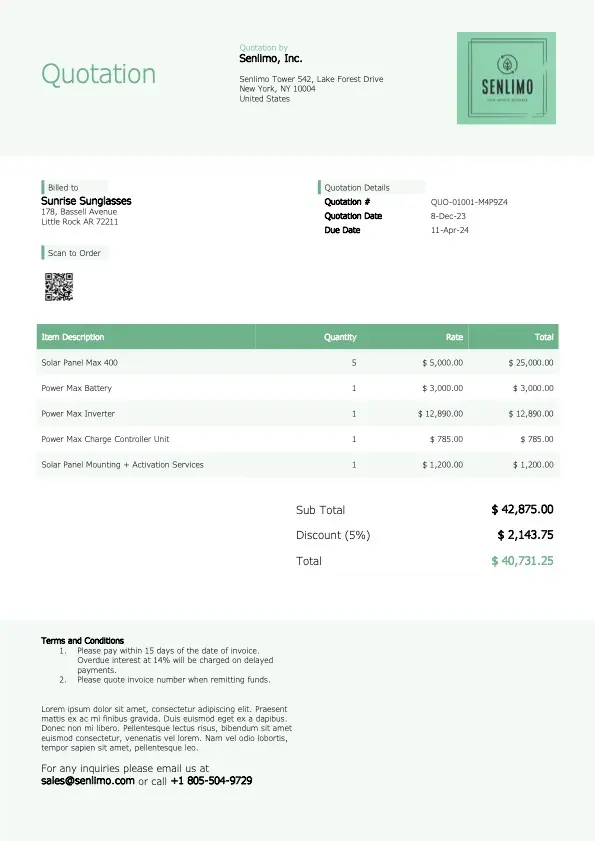What is a Sales Quote: A Comprehensive Guide for Modern Business Practices

It doesn’t matter whether you sell software solutions or snow shoveling services. Regardless of the product/service and organization selling it, the sales quote is one of the most powerful parts of the selling process. And, as a sales professional, you will need to create sales quotes as part of your job.
Summary
- Sales quotes are critical for driving deals, so mastering best practices like customization and follow-ups is key for sales success.
- Automation tools like CPQ software can save sales teams significant time creating accurate, professional quotes.
- Personalization is key – 76% of consumers are more likely to buy when sellers provide a customized, personalized experience.
Sales quotes are documents that tell potential clients how much your product or service is going to cost them. While these documents are not legally binding contracts, they still play an essential role in the sales process and help you begin building a strong business relationship with potential customers.
Sales quoting practices have changed a lot in the last several years, thanks to new tools and technologies that have come on the scene. In this guide, you’ll learn more about the latest sales quoting practices, as well as how to improve your quoting process and avoid common mistakes.
Understanding Sales Quotes
Many people confuse sales quotes with other important documents, such as estimates, invoices, and proposals. While these terms might seem synonymous at first glance, they are quite distinct.
Some of the most significant differences are explained in the table below:
| Sales Quote | Estimate | Invoice | Proposal |
| A sales quote typically comes with a fixed price (or prices).
It’s unique to each customer and their needs. It’s only valid for a specific amount of time. |
An estimate provides more of a ballpark number (or estimated price).
It’s less specific and doesn’t consider unique aspects of the customer’s situation. |
Invoices are documents sent to customers to inform them that a payment is due. | Proposals are generally used when a potential customer or client is working with multiple businesses and comparing them to decide who they want to hire.
They include pricing details as well as additional information highlighting your company’s value. |
Key Elements of a Sales Quote
When putting together a sales quote, specific components should always be included. Here are some of the most important ones to feature:

- Company Details: These include the company name, legal entity type, address, contact information, and the name of your primary contact person.
- Company Logo: Including your company logo helps with brand recognition and trust building.
- Customer Data: This includes the customer name, contact information, contact person, etc.
- Quote Date: Including the date helps with administrative tasks and organization.
- Quote Number: Including the quote number also makes it easier to stay organized.
- Expiration Date: The expiration date lets the buyer know how long you’ll offer a particular price for your goods or services.
- Description of Products/Services: Be very clear about what you’re offering and what’s included in a particular price.
- Pricing Information: Include the price, subtotals, and any applicable discounts or taxes.
- Payment Terms and Conditions: Including terms and conditions helps to prevent confusion and allows you to build a transparent, professional relationship.
Different Types of Sales Quotes
While all sales quotes should include the information mentioned above, they can also come in a variety of types and styles. Here are some of the most common types of sales quotes:
- Itemized: An itemized quote breaks down costs into line items rather than providing one lump sum number.
- Bundle: Bundle quotes offer a combination of products or services as one unit.
- Fixed Price Breakdown: A fixed price breakdown shows the client the exact price they’ll pay and states that the price is not subject to change.
- Request for Quotation Responses: A request for quotation response is written in a format dictated by the sender and typically includes a fixed-price quote.
Best Practices in Sales Quoting
Sales quoting doesn’t have to be complicated, regardless of the type of quote you’re creating for your customers or clients. These best practices will help you create quotes efficiently and effectively:
- Keep Quotes Simple: Strike a balance between being detailed and including so much information that it overwhelms or confuses a potential buyer.
- Customize the Quote to the Client: Look for ways to personalize the quote and tailor it to the client, their business, and their needs.
- Include Upsells and Cross-Sells: Include information about additional products or services that may complement what the customer is considering buying.
- Deliver on Time: Always deliver the quote on (or before) the date you said you would.
- Follow Up: If you haven’t heard from the client in a couple of days, reach out to see if they have any questions.
Sales Quoting Tools and Automation
Nearly 50 percent of salespeople spend over four hours per week just putting quotes together. The right tools, such as customer relationship management (CRM), Configure Price Quote (CPQ) solutions and Document Automation software, can significantly streamline this process and save sales teams a tremendous amount of time.
The table below compares some of the top sales quoting tools to help you decide which one you want to use:
| Tool | Features | User-Friendliness Score | Integrations |
| Experlogix Document Automation |
|
5/5 Users love the easy-to-navigate interface and the software’s overall simplicity. |
|
| Proposify |
|
4/5Fairly easy to use, although some complain about the editing tool being difficult to navigate |
|
| HubSpot Quote Software | Populate sales quotes with CRM system data Easily collect payments and signatures Customize quotes with brand colors and logos |
3.5/5 It is straightforward and easy to use. However, this tool is very simple and doesn’t offer as many features. |
Integrates with over 1,500 apps in the HubSpot marketplace |
Legal Aspects and Compliance
When creating a sales quote, there are some fundamental legal factors you should keep in mind, including the following:
- A sales quote alone is not considered a legally binding contract.
- However, a quote could be regarded as legally binding if the vendor and seller both agree to that condition.
- Fraudulent contracts, as well as contracts agreed upon under duress, are typically not considered legally binding.
- All parties must agree upon the terms and usually need to take additional steps, such as signing the written contract, for it to be legally enforceable.
- When a legally binding agreement has been established, either party can raise a dispute and take the other party to court if they don’t follow through with their obligations.
Put simply, before a quote can become a contract, three things must happen: the seller must submit the quote, the client must accept the quote and place an order for goods or services, and the seller must accept that order.
Trends and Innovations in Sales Quoting
The sales world is constantly evolving, as is the sales quoting process. Here are some trends and innovations to watch for in the coming years:
- Rise of sales automation: Sales automation tools will become more common than ever in 2024 and beyond. Tools that integrate with other solutions and streamline the sales process will be especially popular.
- Emphasis on security and data protection: 87% of consumers say they won’t work with a business if they have concerns about its security practices. Sellers who can assure prospective buyers that they take security and data protection seriously throughout the quoting process will have an advantage over others.
- Personalized experiences: 76% of consumers are more likely to buy from sellers that personalize. When you provide a personalized experience — including customized sales quotes — you can stand out from competitors and close more deals.
Avoiding Common Quoting Mistakes
Even the most skilled salesperson makes mistakes when trying to create an effective sales quote. The following are some of the most common sales quotation mistakes salespeople make, with tips on how to avoid them:
- Taking Too Long to Respond to Quote Requests: If you wait too long to send quotes, the prospective buyer might decide to work with someone else. Reach out as soon as you can to increase your chances of being considered.
- Providing Too Little or Too Much Information: If you don’t include enough information or include too much, you might confuse or overwhelm the buyer. Put yourself in their shoes and consider what they need to know when reviewing the quote.
- Sending Uncustomized Quotes: There’s nothing wrong with using a quotation template, but you should still find ways to customize it to the specific buyer.
- Copying and Pasting Information: Copying and pasting could cause you to send inaccurate or irrelevant information to a potential customer.
- Spending long periods of time to create a Quote: Manually creating quotes can be time-consuming for your sales team resulting in time away from making the sale.
Always spellcheck your quotes before sending them, too. Forgetting to do so can make you look unprofessional.



